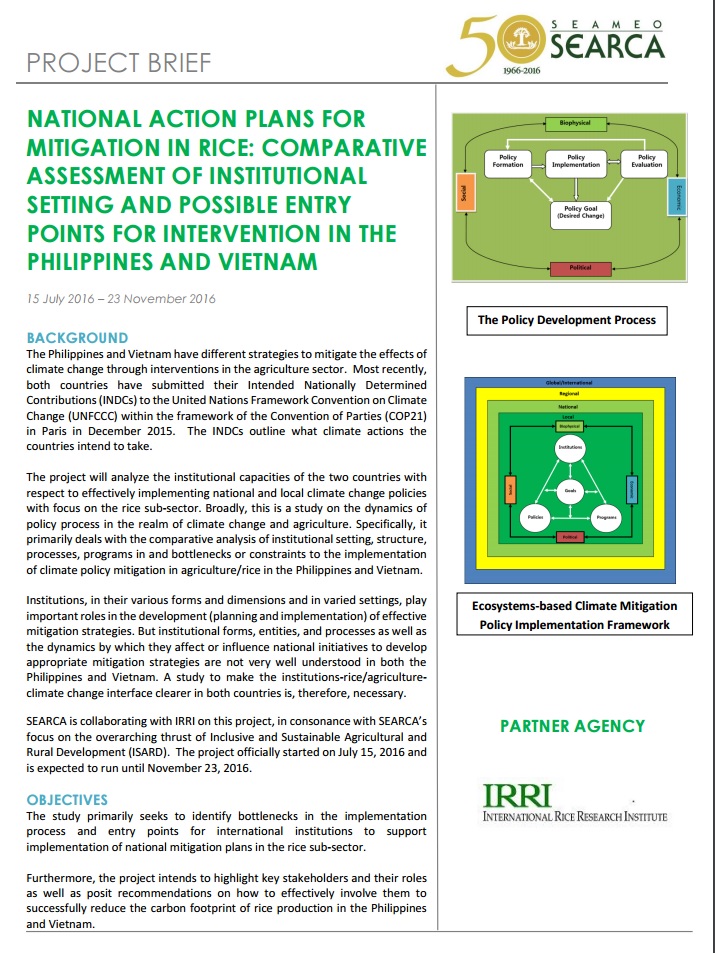National Action Plans for Mitigation in Rice: Comparative Assessment of Institutional Setting and Possible Entry Points for Intervention in the Philippines and Vietnam
15 July 2016 – 31 January 2017
Background
 The Philippines and Vietnam have different strategies to mitigate the effects of climate change through interventions in the agriculture sector. Most recently, both countries have submitted their Intended Nationally Determined Contributions (INDCs) to the United Nations Framework Convention on Climate Change (UNFCCC) within the framework of the Convention of Parties (COP21) in Paris in December 2015. The INDCs outline what climate actions the countries intend to take.
The Philippines and Vietnam have different strategies to mitigate the effects of climate change through interventions in the agriculture sector. Most recently, both countries have submitted their Intended Nationally Determined Contributions (INDCs) to the United Nations Framework Convention on Climate Change (UNFCCC) within the framework of the Convention of Parties (COP21) in Paris in December 2015. The INDCs outline what climate actions the countries intend to take.
The project will analyze the institutional capacities of the two countries with respect to effectively implementing national and local climate change policies with focus on the rice sub-sector. Broadly, this is a study on the dynamics of policy process in the realm of climate change and agriculture. Specifically, it primarily deals with the comparative analysis of institutional setting, structure, processes, programs in and bottlenecks or constraints to the implementation of climate policy mitigation in agriculture/rice in the Philippines and Vietnam.
Institutions, in their various forms and dimensions and in varied settings, play important roles in the development (planning and implementation) of effective mitigation strategies. But institutional forms, entities, and processes as well as the dynamics by which they affect or influence national initiatives to develop appropriate mitigation strategies are not very well understood in both the Philippines and Vietnam. A study to make the institutions-rice/agriculture-climate change interface clearer in both countries is, therefore, necessary.
SEARCA collaborated with IRRI on this project, in consonance with SEARCA’s focus on the overarching thrust of Inclusive and Sustainable Agricultural and Rural Development (ISARD). The project was conducted from 15 July 2016 to 31 January 2017.
Objectives
The study primarily aimed to identify bottlenecks in the implementation process and entry points for international institutions to support implementation of national mitigation plans in the rice sub-sector.
Furthermore, the project intended to highlight key stakeholders and their roles as well as posit recommendations on how to effectively involve them to successfully reduce the carbon footprint of rice production in the Philippines and Vietnam.
Methodology
Comparative assessments were undertaken using primary data gathered through interviews and secondary data. The project had a comparative analysis of the following:
- Institutional settings and processes for implementation of climate change policies in the agriculture sectors of Vietnam and the Philippines using the example of altered irrigation as mitigation strategy, including description of roles of stakeholders;
- INDCs, national climate change action plans and other initiatives related to greenhouse gas (GHG) mitigation in the agriculture sector of the two countries, with a focus on the rice sub-sector;
- Possible bottlenecks for implementation of climate change policies in the rice-subsector and entry points for intervention; and
- How climate change policies developed at the national level translate to change at the local level.
A case study was undertaken on the translation of climate change national policies to change at the local level.
Outputs
- Improved level of understanding of the dynamics of implementation of climate change mitigation policy, particularly in the rice sub-sector, in the Philippines and Vietnam
- Better grasp of the INDCs, national climate change action plans, related initiatives in GHG mitigation in the rice sub-sector and the resources entailed
- Identified potential bottlenecks in the implementation of national mitigation plans in the rice sub-sector
- Possible entry points for interventions in support of the implementation of national mitigation plans in the rice sub-sector
- Understanding how climate change policies developed at the national level are translated to the local level
- Recommendations on effectively involving stakeholders to reduce the carbon footprint of rice production in the Philippines and Vietnam
